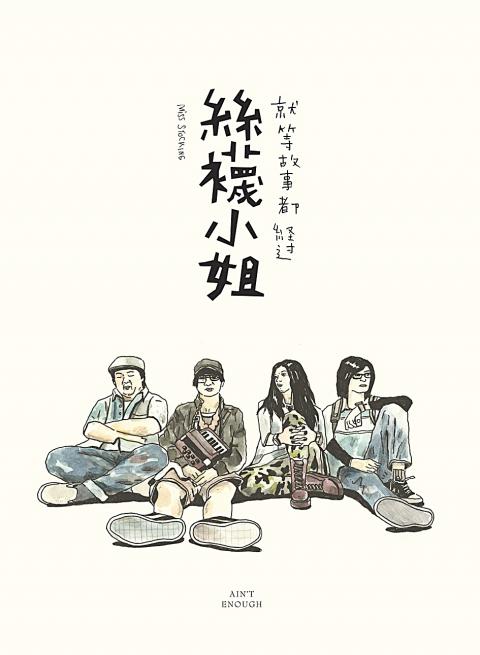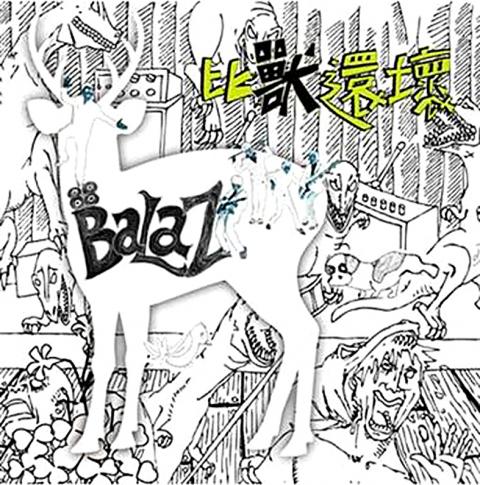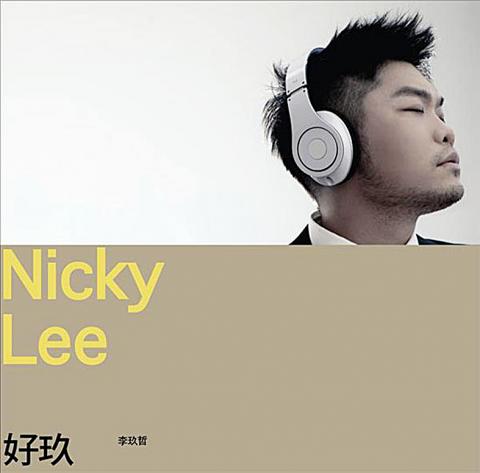Miss Stocking (絲襪小姐)
Ain’t Enough (就等故事都經過)
AsiaMuse/HeyWatchOut Ltd

Miss Stocking (絲襪小姐) is an indie-pop band with a clean, immaculate sound that centers on the whispery sweet vocals of female singer-songwriter Chan Cheng-yun (詹正筠).
The band’s first full-length album, Ain’t Enough (就等故事都經過), leans toward the mainstream with tight pop arrangements, but also holds escapist appeal with song structures that embrace indie rock melodrama. Fans of Taiwanese post-rock might recognize the chiming guitar work by Huang Chien-hsun (黃建勳), aka Hsiao Bai (小白), also a member of Sugar Plum Ferry (甜梅號).
But it’s Chan’s enchanting voice that draws listeners into Miss Stocking’s world, which is also portrayed in a comic included with the CD. The 40 pages of manga-style illustrations, drawn by Chan, follow the band members as they search for Kaduoli (卡多里), a mythical amusement park in a “magic forest” on the outskirts of the city.

As it dwells on the characters’ (the band members’) personality quirks, the comic, while nicely illustrated, comes across as self-absorbed. But there are a few poignant moments in the story, such as when Chan’s character, Hsiao Gui (小龜), reveals her reasons for searching for Kaduoli: her grandfather told her about the amusement park when she was a child, but she always thought the story to be make-believe. Years later, while sick in the hospital, he promised to take the adult Hsiao Gui there if he recovered. That didn’t happen, and thus she yearned to find Kaduoli.
Scenes like this, along with the comic’s surreal conclusion, make the story seem less insular, and also lend weight to the music. With dreamy acoustic tracks like In the End, the slow-burning rocker Solitude and the joyful, carnival-like The King’s Playground (國王操場), it’s obvious that the songs are intended to have a symbiotic relationship with the story.
The album displays solid songwriting and pristine production values, and fans of Taiwanese indie pop will likely warm up to it right away. Casual listeners, though, may have to make an extra effort to appreciate the band’s inward gaze.

— DAVID CHEN
88 Balaz (88顆芭樂籽)
Man Is Worse Than an Animal When He Is an Animal (比獸還壞)

Himalaya Records
88 Balaz (88顆芭樂籽), a favorite in Taiwan’s indie rock scene, returns with a solid follow-up to its 2008 release The 44 Stone Lions (肆十肆隻石獅子).
The barrage of electric guitars and screeching hoots and howls from lead vocalist Ah-Chang (阿強) live up to the album’s mouthful of an English title, Man Is Worse Than an Animal When He Is an Animal (比獸還壞).
One reason that 88 Balaz enjoys a loyal following is the group’s onstage verve, and this album is a decent snapshot of that energy.
The first track, 21st Century Rock ’n’ Roll Style, offers a modern tribute to AC/DC by quoting the main lyric from the Australian band’s classic tune It’s a Long Way to the Top (If You Wanna Rock ’n’ Roll), and is followed by another rollicking anthem, Adrenaline Song (腎上腺素之歌).
The declarations of “rock ’n’ roll” start to feel a little repetitive by the time Man Is Worse Than an Animal gets to Give You a Flying Kick Before I Die (我要在死之前給你一個飛踢), but the album’s saving grace is its catchy blues-rock grooves and Ah-Chang’s screamo vocals.
The band brings in a horn section for the ska-infused Let’s Dance (一起來跳舞) — a reflection of the growing popularity of reggae and its related genres among Taiwanese music fans. One of the CD’s better tracks, 29 Years Old (29歲) gets the brass treatment too, with the sound referencing The Clash circa London Calling.
While the album is full of punk sneering and “let’s party” attitude, Ah-Chang shows nuance in his songwriting, particularly in the slower, low-key closing tracks. The surreal lyrics, breezy chords and spacey grooves make Bad Temper Fish (脾氣不好的魚) equally as fun and compelling as the fast songs, and Taipei, Taipei (台北台北) is an honest and thoughtful ode to the band’s home base.
— DAVID CHEN
Nicky Lee (李玖哲)
Long Time (好玖)
Asia Muse
South Korea-born American
R ’n’ B crooner Nicky Lee (李玖哲) is that rare performer who is capable of maintaining a music career in a language he isn’t well versed in. A Best Mandarin Male Singer Golden Melody Award-winner for his second album, Baby It’s Me (Baby是我), Lee proves that a soulful voice can cross the language barrier.
But in Lee’s newest outing, Long Time (好玖), mediocre material prevents him from doing his emotive voice justice.
The album’s most glaring blooper is opening track Right Here Waiting. Meant as a homage to Richard Marx, this cover sees Lee performing a note-by-note imitation of Marx’s original with little improvisation.
Faring much better is Lee’s cover of Air Supply’s hit Making Love Out of Nothing at All. On this track, which formed part of the sound track to gangster flick Monga (艋舺), Lee deploys his idiosyncratic brand of R ’n’ B phrasing to update what could easily have turned out to be a pedestrian cover of a hackneyed
love song.
Best known as an R ’n’ B singer, Lee flourishes on the album’s two up-tempo tracks. In Summer (夏天), written by Mando-pop king Jay Chou (周杰倫), Lee successfully gets his mouth round some rapid-fire rapping.
Elsewhere, Lee’s soulful voice flounders on turgid tracks, such as The Last Day (最後的那一天), and the banal No More Love (不愛了).
Although Lee whittled the album’s six self-penned songs down from a purported 38, his original material doesn’t stand out. With merely nine tracks and clocking in at just under 40 minutes long, the album is short but not sweet.
— ANDREW C.C. HUANG
Elva Hsiao (蕭亞軒)
Miss Elva (瀟灑小姐)
Golden Typhoon Music
Not long ago, Mando-pop diva Elva Hsiao (蕭亞軒) rejuvenated her career with the pop confection Diamond Candy (鑽石糖). Now she returns with another electronica-driven album, Miss Elva (瀟灑小姐).
With her proud declarations of female empowerment and synthesized dance music sound, Hsiao could have called this album “Feminist on the Dance Floor.”
Although previously acclaimed for her entrancing delivery of R ’n’ B ballads, Hsaio has grasped dance music with both hands. With Miss Elva, her most dance-heavy album to date, she successfully establishes herself as a rival to dancing queen Jolin Tsai (蔡依林).
To infectious beats, Hsiao sings “Oh, I like you/Oh, don’t repress it” on the title track Miss Elva, and then encourages her lover to join her in a flight of romance in Let Love Fly (讓愛飛起來).
The album’s opening optimism turns sour on Big Liar (大說謊家), with Hsiao condemning a deceptive lover. And then come the ballads. She moans about misspent love in The Wrong One (錯的人), and rails at someone who takes romance frivolously in Joke (玩笑).
Though the lukewarm romantic tracks do not pack the same poignancy Hsiao achieved in her earlier work, such as I Love So Much (我愛你那麼多) or Interlude (插曲), what is lost here is more than made up for by the kinetic energy of the album’s feel-good electronica.
Perhaps on her next album, Hsiao will juggle her newfound passion for dance music and her powerful vocals with a finer balance.
— ANDREW C.C. HUANG

The 1990s were a turbulent time for the Chinese Nationalist Party’s (KMT) patronage factions. For a look at how they formed, check out the March 2 “Deep Dives.” In the boom years of the 1980s and 1990s the factions amassed fortunes from corruption, access to the levers of local government and prime access to property. They also moved into industries like construction and the gravel business, devastating river ecosystems while the governments they controlled looked the other way. By this period, the factions had largely carved out geographical feifdoms in the local jurisdictions the national KMT restrained them to. For example,

The remains of this Japanese-era trail designed to protect the camphor industry make for a scenic day-hike, a fascinating overnight hike or a challenging multi-day adventure Maolin District (茂林) in Kaohsiung is well known for beautiful roadside scenery, waterfalls, the annual butterfly migration and indigenous culture. A lesser known but worthwhile destination here lies along the very top of the valley: the Liugui Security Path (六龜警備道). This relic of the Japanese era once isolated the Maolin valley from the outside world but now serves to draw tourists in. The path originally ran for about 50km, but not all of this trail is still easily walkable. The nicest section for a simple day hike is the heavily trafficked southern section above Maolin and Wanshan (萬山) villages. Remains of

With over 100 works on display, this is Louise Bourgeois’ first solo show in Taiwan. Visitors are invited to traverse her world of love and hate, vengeance and acceptance, trauma and reconciliation. Dominating the entrance, the nine-foot-tall Crouching Spider (2003) greets visitors. The creature looms behind the glass facade, symbolic protector and gatekeeper to the intimate journey ahead. Bourgeois, best known for her giant spider sculptures, is one of the most influential artist of the twentieth century. Blending vulnerability and defiance through themes of sexuality, trauma and identity, her work reshaped the landscape of contemporary art with fearless honesty. “People are influenced by

Ten years ago, English National Ballet (ENB) premiered Akram Khan’s reimagining of Giselle. It quickly became recognized as a 21st-century masterpiece. Next month, local audiences get their chance to experience it when the company embark on a three-week tour of Taiwan. Former ENB artistic director Tamara Rojo, who commissioned the ballet, believes firmly that if ballet is to remain alive, works have to be revisited and made relevant to audiences of today. Even so, Khan was a bold choice of choreographer. While one of Britain’s foremost choreographers, he had never previously tackled a reimagining of a classical ballet, so Giselle was